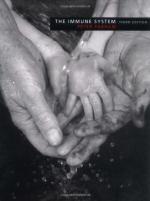|
This section contains 1,352 words (approx. 5 pages at 300 words per page) |

|
Immunochemistry is the study of the chemistry of immune responses.
An immune response is a reaction caused by the invasion of the body by an antigen. An antigen is a foreign substance that enters the body and stimulates various defensive responses. The cells mainly involved in this response are macrophages and T and B lymphocytes. A macrophage is a large, modified white blood cell. Before an antigen can stimulate an immune response, it must first interact with a macrophage. The macrophage engulfs the antigen and transports it to the surface of the lymphocytes. The macrophage (or neutrophil) is attracted to the antigen by chemicals that the antigen releases. The macrophage recognizes these chemicals as alien to the host body. The local cells around the infection will also release chemicals to attract the macrophages; this is a process known as chemotaxis. These chemicals are a response to the infection...
|
This section contains 1,352 words (approx. 5 pages at 300 words per page) |

|


